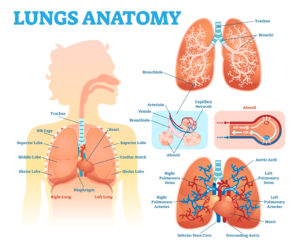
Pneumonia is a serious infection causing inflammation to one or both lungs. The air sacs (alveoli) in the lungs fill with fluid and pus, making it difficult for the person affected to breathe. When the air sacs in the lungs’ fill it impairs their main function, which is to get oxygen from the air into the bloodstream. If there is too little oxygen in the blood, the cells in the body can’t work properly.
Pneumonia affects the lungs in 2 ways. If the inflammation affects a section (lobe) of a lung it is called lobar pneumonia and if patches throughout both lungs are affected, it is known as bronchial pneumonia. The term double pneumonia means both lungs are affected.
What causes pneumonia?
Pneumonia can be caused by bacteria, viruses, fungal infections or chemical exposure, sometimes the exact cause of pneumonia is never known. The most common types of pneumonia are as follows:
What are the symptoms of pneumonia?
Symptoms of both bacterial and viral pneumonia are similar and usually last about 2 weeks. Symptoms may include any of the following:
If you believe you might have pneumonia or have a persistent cough, then you should visit your doctor for further advice.
Am I at risk of getting pneumonia?
Anyone can get pneumonia, even the young. However, it is more common and more serious if you:
How is pneumonia diagnosed?
Your doctor can usually diagnose pneumonia by listening to you breathe with a stethoscope. If he/she suspects you have pneumonia, you will usually be referred to a hospital for a chest X-ray to see how bad the condition is.
If the condition is severe the doctor will take a sample of your phlegm to examine under a microscope. The doctor will then try to grow the organism that is causing the infection, to find out which type of pneumonia you have.
What treatment is there for pneumonia?
If you have bacterial pneumonia your doctor will prescribe a coarse of antibiotics (such as amoxicillin) if however, you have viral pneumonia it will get better on its own. With both types of pneumonia you should get plenty of bed rest, take painkillers to reduce the fever and drink 8 glasses of juice or water a day.
If pneumonia is severe you may need to be hospitalized for treatment. Treatments you receive in hospital may include; supplementary oxygen to help with breathing, physiotherapy to help clear mucus and/or antibiotics given directly into the vein. However, the majority of people with pneumonia will not need to be hospitalized.
Are there any complications with pneumonia?
Most people with pneumonia will make a full recovery, although a feeling of tiredness may persist for some time after. However, for those people who are very young (under a year), elderly or have a weakened immune system, pneumonia can be fatal.
What can I do to prevent getting pneumonia?
As pneumonia can be the result of flu and if you are in a high-risk group (see ‘am I at risk’ above) ensure you ask your doctor about the flu vaccination (only for certain strains). For more information on flu and immunization click here. To prevent pneumonia you should avoid smoking, smokers are much more at risk of getting pneumonia than non smokers.
There is a vaccine available to protect against infection with pneumococcal pneumonia, the most common cause of pneumonia. This vaccine is recommended for anyone with lung or heart problems.